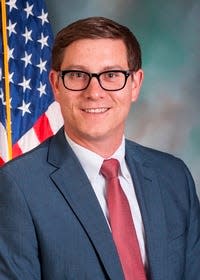Why this Pennsylvania lawmaker thinks child influencers need legal protection
At a moment when even toddlers are growing online audiences of millions, a Pennsylvania lawmaker believes the commonwealth should become the latest state to protect children from labor and financial exploitation on social media platforms.
About a century ago, U.S. lawmakers cracked down on factories, mills and mines that kept children working long hours in unsafe conditions. At the advent of motion pictures, California policymakers enacted a law that sought to protect child actors from losing all their earnings to their parents.
The next frontier for child labor laws relates to social media, Pennsylvania Rep. Torren Ecker argues.
“We’ve all heard the stories of childhood stars that have been exploited by their parents,” said the Republican lawmaker who represents Adams and Cumberland counties. “Right now, there’s no protections for these kids that are on the internet earning income.”
The top child influencers, often appearing on accounts run by their parents, rake in millions of dollars each year, between brand deals and other revenue streams. But, as they grow up, some young influencers are beginning to speak out about the consequences of spending their youth in the public eye — and voicing anger at their parents for putting them there.
Chris McCarty, a college student from Washington state who created the site Quit Clicking Kids, began advocating against the monetization of children online after hearing about family vloggers who posted videos about adopting a child with special needs from China.
Several years after these adoption videos had gone viral, amassing millions of views, the parents announced they were relinquishing custody of the boy to another family they felt were better suited to meet the child’s special needs.
“From the outside, at least, it seemed like it wasn’t a good situation,” said McCarty who uses they/them pronouns. “So that spurred me to do more research on family influencing as an industry, as a career, and what regulations are there — if any — to protect these children.”
Though there weren’t any such laws in Washington at the time, McCarty has pushed for the passage of a bill to enact child influencer protections in their home state.
Last month, Ecker announced he’ll be introducing a bill he says would make sure child influencers retain access to at least some of their earnings, such as by requiring that a portion of the money goes into a trust that they could access as adults. His legislation would also attempt to limit the time children spend in front of the camera, he said.
If passed, Pennsylvania would become among the first states in the nation to institute a labor law protecting young influencers.
More: 'Armed, trained, and vetted': Pa. lawmaker calls for schools to beef up security
Ecker said he doesn’t think social media is always harmful for children; his own kids enjoy watching "Ryan’s World," a YouTube account that features a 11-year-old doing science experiments and playing make-believe. The videos on the account each generally rack up hundreds of thousands of views.
Still, the universe of social media can also be damaging to kids in ways that policymakers haven’t fully explored, Ecker said.
“These are conversations this bill will also hopefully spark, so that we can figure out, what is social media in our kids’ lives?” he said. “It can be a great place, but it also can be a pretty dangerous place.”
The Pennsylvania lawmaker is patterning his legislation in part after one that Illinois lawmakers recently passed enabling child influencers to sue their parents for proceeds from social media content featuring them.

The original measure would’ve also empowered these young influencers once they reached adulthood to demand that platforms take down videos or images that included them. An industry group called TechNet contends that this provision would’ve created unintentional consequences by requiring social media companies to collect even more personal data about their users.
Hypothetically, anyone could ask a social media platform to take down a piece of content, even a competitor of the influencers who produced it, said Tyler Diers, who serves as executive director of TechNet in Illinois and the midwestern region.
So to comply with this provision, he said, tech companies might have to examine a person’s driver's license or other form of identification before granting a request to remove a video or picture.
“This bill would have — as introduced, at least — would have required an increase of collection and storage of personal information, not less,” Diers said. “When we talk about privacy, that's not necessarily a goal of the legislation.”
Also, since social media posts often migrate from platform to platform after they’re posted, it would be a logistical burden to purge the internet of a certain piece of content, Diers argues.
TechNet took a neutral position on the final Illinois bill, without the removal provision.
McCarty expressed skepticism that a content-removal requirement would be impractical and said these types of protective measures shouldn’t be dismissed simply because they’re new and unfamiliar.
It’s important to recognize, McCarty argued, that family influencer accounts don’t always post positive or benign content about children. In the case of the child adopted from China, the parents broadcast sensitive information about their then-son, discussing his medical and neurological conditions, McCarty noted.
“This is not just family fun, vacations and things that are being shared online,” they said. “A lot of the time, it’s also mental health struggles, struggles at school, hospital visits. A lot of things that are personal and could potentially pose a risk to the child if they’re shared to a wide audience.”
This article originally appeared on Beaver County Times: PA could become one of the first states to protect child influencers
